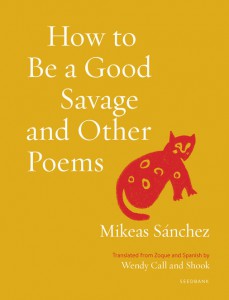The new year is all dressed up with a powerful display of voices in translation: a Japanese epic, a tri-lingual edition of Mexican poetry, and the latest collection of prose from one of France’s most spiny and entertaining voices. Read on to find out more!

Marshland by Otohiko Kaga, translated from the Japanese by Albert Novick, Dalkey Archive Press, 2024
Review by Iona Tait, Copy Editor
In a 1986 article published in Japan Quarterly, the Japanese psychiatrist-turned-novelist Otohiko Kaga wrote about his captivation with the Japanese marshes, describing them as “a wasteland, totally resistant to human attempts at exploitation.” These same untouched regions make up the setting of his novel Marshland, originally published in 1985 and translated now into English by Albert Novick. In this sprawling epic, the marshes, as a virgin land, act as a counterpart to the oppressive state structures of the metropolis. They—being of no use—allow Kaga to explore his central theme: space, and the reclamation of space for freedom and freedom of thought.
Hailing from the marshes, the protagonist, Atsuo Yukimori, is a middle-aged former convict whose job as an auto-mechanic in Tokyo keeps his life together—but only barely. Spending the majority of his life “as a slave to the state,” he lives in fear of the army and the police, and his job security depends on the whims of his boss, to whom the former speaks “like a puppy dog.” All the while, Atsuo’s criminal past lingers in close quarters, with a burn on his finger (punishment for stealing as a child) standing as a reminder. The delicate order of this life—his tidy bedroom, his punctuality—soon begins to unravel, however, when he meets a young student called Wakako Ikéhata at an ice rink. The pair develop an intense relationship, and eventually find themselves entangled in the violent student protests of 1968. Falsely accused of placing a bomb on a train, Atsuo and Wakako are detained by police and imprisoned, spending ten years in prison waiting for a judicial appeal.
Spanning over eight hundred pages, Marshland details governmental abuses of power in post-war Japan through various narrative perspectives, various institutions, and across a vast period of time. Kaga masterfully demonstrates the grueling legal process that kept Atsuo and Wakako in prison, including their detention before being forced to give a confession (detaining individuals before they were sentenced was a feature of Japanese criminal law until it was overturned in 2023). Repeating the details of the trial throughout the majority of the novel, Kaga shows the mentally and physically taxing effects, ranging from psychosis to suicide, of institutionalization and detention on every victim involved—which include Atsuo’s nephew, Yukichi Jinnai, and Wakako’s former lover, the radical student Makihiko Moroya. Whilst this technique does result in a few tedious episodes in which legal particularities are rehashed at length, the approach heightens the all-consuming nature of the trial for the convicts, and succeeds in conveying the lengthy passage of time; the novel alternates between the day-to-day pace of scenes in Tokyo, visits to the marshes, long periods in prison, and swift logs or diary entries which reveal the laboring process of the trial and work done by Atsuo’s lawyers.
Not limiting Marshland to police detention, Kaga is at pains to display the different ways in which institutionalization and ostracization manifested in post-war Japan. In a first-person account, addressed to Atsuo in flashback, Wakako reveals that her refusal to follow a conventional life—much to the dismay of her father, who occupies the archetypal establishment profession of law professor—had resulted in a series of institutionalizations in a mental hospital. In addition to detailing her character, these passages dedicated to Wakoko’s time in the hospital illuminate the other patients who have been sidelined by society—all of whom Kaga portrays with great sensitivity. Eluding the “rational” ways demanded by society (what is called at various times in the novel “organizational thinking”), these outsiders are “all completely honest about expressing their views of the world.”
Most notable among the patients is Tsu, who communicates with the stars, and the interactions with Tsu cause Wakako to reflect on the irony that organizational bodies and their followers have “complete contempt for these patients.” For Wakako, it is the patients who think freely. Yet industrial Japan has no space for those who fall outside its strict confines—and the reclamation of such space is the central point of conflict for the students in their protests against the state. The students’ occupation of a looming tower in the fourth chapter can be read in this context; the industrialization of Tokyo builds a wall between those who can be contained within society, and those who fall outside.
Implicitly referencing her conversation with Tsu in the hospital, Wakako tells Atsuo towards the novel’s end: “Your generation is made of star people. I’m from the smog generation.” Here, we see the other side of industrial Japan—not just the economic miracle but also how the stifling constraints of space in Tokyo inevitably categorize people into types—as Kaga wonderfully illustrates in his depictions of the various criminals and pickpockets that Atsuo meets in prison. In Tokyo, nothing is free from the strictures of organization: “the will that moves nature was hiding. It was hidden by concrete and steel and cars and glasses.” This is contrasted by rural Japan, where the natural hierarchy has no interest in the social structures of Tokyo. Atsuo’s boss’s haughty lover, who treats the protagonist with disrespect, is out of her comfort zone in a scene devoted to a fishing trip. For Wakako, too, Atsuo represents another way of life: “the salmon, the Furen river, the snow mobile, Atsuo Yukimori.”
Kaga’s characterization of Wakako, however, can come close to infantilization and hyper-feminization; the dynamic of a virile and handsome middle-aged man sexually fulfilling a quirky young girl is, at times, uncomfortable. The author is instead at his best in writing of the beauty of the marshes and the passing of seasons there—the icy winters and the thawing of snow in spring.
Meeting on an ice rink, the lovers feel free gliding on the flat surface—the only form ice can take in the city. Fascinated during her first visit to rural Japan, Wakako sees “the unexpected variety of forms” of ice in the glacier. Outside the city lie untouched lands, “a space consisting of nothing but self and ice.” Whilst Kaga sometimes describes the student radicals with disdain (spouting extreme opinions and interfering with the trial on the basis that terrorism is revolutionary), it is ultimately the book written by Makihiko during his time in prison that contains the central—and most compelling—idea of the novel: “there are territories the state isn’t interested in, because they aren’t useful to its purposes.” It is in these lands that the characters can be free.

Museum Visits by Éric Chevillard, translated from the French by Daniel Levin Becker, Yale University Press, 2024
Review by Bridget Peak, Digital Editor
Éric Chevillard has endured as one of the last among a dying breed of exceptional experimental French writers. Unquestionably prolific, he has quietly built an oeuvre brimming with works that span genres, forms, and ideas, including the novel La nébuleuse du crabe, for which he won the Prix Fénéon; a six-year archive of a weekly column for Le Monde; and daily entries on his online blog, active for over a decade. Now, in Museum Visits, Chevillard is at his best, spewing anxious observations of the everyday in shortform. From the frenetic account of soup left on a burning stove to a study of the chair as predator, translator Daniel Levin Becker elegantly channels the perceptive, comedic voice of the postmodern writer’s agitations into a language that mirrors Chevillard’s agile French—despite the author himself mocking English as an “informative, utilitarian airport [language] that … seems to have been developed for small-scale arms trafficking!”
Museum Visits is a compilation of observations on the normally unobserved, from the frames around masterpiece paintings to the staircase (“open, overturned drawers”), loosely coalesced around the theme of the museum. It begins with “The Guide”, which describes a familiar scene in which the reader is ushered from one nondescript place to the next, as former witnesses of pivotal moments in history: “. . . here Pablo Picasso ogled the buttocks of a girl who was manifestly too young, this is where George Sand relit her cigar—please put out your cigarettes, this is a no-smoking area now.” Later, in “The Museum Visit”, the first of a three-part exposé on the predictability of modern man, Chevilliard turns his sardonic gaze to the unquestioning performance of museum-going, for he doesn’t comprehend the supposed appeal in works on display. He visits the museum for the floors (“Ah! Such music beneath my feet! They’re bards, these boards!”), and the frames (“Those four lengths of wood bind the world tightly, its rivers and its mountains and all the madness of humankind.”), and the overlooked, minor masters (“the secondary figures of trowelism, the seascapes of Auvergnat Blot”).
While deliriously funny, Chevillard’s short prose also palpitates from one anxious cogitation to another, borderline neuropathic and deeply intimate. The nature of the observer is a lonely one, and between commentary that is laugh-out-loud funny, Museum Visits reveals the depth of its writer’s feeling, which leads him to see his surroundings with such uncommon dynamism. In “An Overwhelming Success”, we are treated to a commentary on control over consciousness—and lack thereof. Here, Chevillard painstakingly builds an imaginary museum, only to find it ransacked, save for a few paintings by his children. Upon this discovery, he is not moved to grief nor anger, but is relieved to have returned to that “blessed primordial emptiness of those uncreated worlds where everything remains to be done.” We recognize this release as a surrender, a weary refusal to struggle against a world which has its own plans.
This inner self is further divulged in “Autofiction,” wherein Chevillard impresses his primal urge to write, comparing this daily practice to the most animalistic, shared impulse, while divulging the deep recesses of his feeling: “Ejaculating saved my life, I’m not afraid to say it. If I hadn’t ejaculated I wouldn’t be here today. More than once I have wanted to die, to kill myself—yes—and instead I ejaculated. And when you ejaculate in a moment like that it is so good, so powerful, that it practically vibrates from all the motion held in for too long.”
In his fluid translation, Daniel Levin Becker matches the minute tonal shifts across the collection; this is best exemplified in his innovative handling of “Decalcifies and Disinfects,” a caustic account of the erosion of the French language and, in a deeper vein, a confession of feeling alien within one’s kin. In one line, Becker translates the quintessentially French derision of the English language to the English—“If only you knew how agreeable it is to get on without either gesticulating or botching the English already butchered by the Americans,”—and in the next, he captures the intimacy of the French its author: “And as I wash my hands I notice, attached to the plumbing system, a white plastic casing on which I read: DÉTARTRE ET DÉSINFECTE. Yes, you have correctly read these words written in proper French, in excellent French, DECALCIFIES AND DISINFECTS. . . And I tilt my head to drink one drafts of water from the faucet, certain that this plumbing is healthy and sound. . . actively decalcifying and disinfecting, that the words of my language have not abandoned me in my exile either.”
In Museum Visits, the reader is elevated, planted in Chevillard’s unordinary perspective and given access to an inside joke told by an author of extraordinary wit. Invited into the inner chambers, we share in the author’s observations of the outside, the other. While this exceptionalism could be read as arrogant, even cruel, Chevillard’s brilliance is ultimately in his vulnerable, self-awareness; anyone who has felt—even for a minute—as though they were not quite made for this world would relate. To read Museum Visits is not only to laugh at the painfully mundane, but to recognize our shared ostracism in and from this strange world we have built.

How to Be a Good Savage by Mikeas Sánchez, translated from the Zoque by Wendy Call and Shook, Milkweed Editions, 2024
Review by Rubén Lopéz, Editor-at-Large for Guatemala
Mikeas Sánchez’s poetry collection, How to Be a Good Savage, fractures linguistic borders, creating an atmosphere of fluid dialogue. The skillful translation by Wendy Call and Shook, published by Milkweed Editions, presents Sánchez’s poems in three languages: Zoque (an indigenous language from southern Mexico), Spanish, and English. This tripartite layout deliberately showcases her verses in these different textures, causing an exquisite, distorted mirror effect in each poem. As the poems dance between languages, they become a testament to the cultural tensions produced by colonialism.
Sánchez’s poetry resonates with what Cristina Rivera-Garza has termed necro-writings—liminal texts that destabilize the notion of fixed or permanent identities. In subverting the ultimate finality, the dead, in these poems, become the only entities that can be revived, and Sánchez’s poetry conjures her ancestors with tenderness, rage, and devotion. Harnessing the power of words, she explores how her community has used and inherited them:
My grandfather was a poet
who healed with words.
But he wanted to be a good savage,
learned to eat with a spoon,
and the Nhkirawa’s electric lamps
impressed him . . .
This poignant portrayal of a grandfather torn between the mandate of assimilation and his cultural identity paints a vivid, delicate interplay between tradition and the allure of Western modernity, highlighting the assimilation drive imposed on indigenous peoples. The false promise of a “future” that Western modernity offers in exchange for one’s identity is a recurring theme, and as Sánchez emphasizes that there is no future without memory, she exposes the trap disguised as progress. Simultaneously, the dialectical tension between “civilization” and “barbarism” is expressed in the recurrent search for the city as a referent opposed to what her community considers sacred: “We children of Saspalanki cry in the Big City, / and so, when we finally return home, / our nagual dances as if on fire, / dances as if at fiesta.” This continual openness towards and exploration of hybridity thus challenges limits imposed by both Western and Zoque culture, embodying the spirit of Greek hubris:
I the ancient grandmother Oko’chuwe,
who blasphemed with zeal
our hidden gods.
The power of language, a recurring motif, emerges not just through the verses themselves, but in how a community can utilize and inherit them. Sánchez’s verses resonate with the collective memory, a communal sharing of stories that transcend time; in this, the act of conjuring ancestors becomes an act of preservation, a homage to the oral traditions that persist into the present.
Like hungry ceremonial fire, Sánchez’s words reach out to the world, naming it and devouring it simultaneously; each syllable of her Zoque verses becomes a spark, seeking to illuminate the shadows cast by historic and systemic violence against her people, as she uses the living entity of language to voraciously consume experiences and emotions. Yet, her act of naming is not just a linguistic exercise but a cosmic ritual, employing repetition and personification of the natural world in her words:
Someone buried our memory,
someone rolled our hearts,
someone tried to smother our flame.
How to Be a Good Savage is a testament to the power of language as a living, breathing entity. It serves as an exploration of identity, a rebellion against fixed categories, and a celebration of Zoque culture. Through the interplay of languages, the summoning of ancestors, and the hungry flame of words, Sánchez invites readers into a world where poetry becomes a transformative force, shaping realities and transcending boundaries. This collection goes beyond its verses; it is a journey into the liminal spaces—where words have the power to redefine identities, and reshape the narrative.
*****
Read more on the Asymptote blog:

